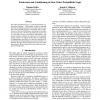16 search results - page 1 / 4 » Approximate inference for first-order probabilistic language... |
126
click to vote
UAI
2008
15 years 4 months ago
2008
Approximate inference in dynamic systems is the problem of estimating the state of the system given a sequence of actions and partial observations. High precision estimation is fu...
156
click to vote
AAAI
2012
13 years 5 months ago
2012
Tractable subsets of first-order logic are a central topic in AI research. Several of these formalisms have been used as the basis for first-order probabilistic languages. Howev...
158
click to vote
AAAI
2011
14 years 2 months ago
2011
Coarse-to-fine approaches use sequences of increasingly fine approximations to control the complexity of inference and learning. These techniques are often used in NLP and visio...
130
click to vote
AIPS
2007
15 years 5 months ago
2007
Most traditional approaches to probabilistic planning in relationally specified MDPs rely on grounding the problem w.r.t. specific domain instantiations, thereby incurring a com...
159
click to vote
AAAI
1996
15 years 4 months ago
1996
First-order probabilistic logic is a powerful knowledge representation language. Unfortunately, deductive reasoning based on the standard semantics for this logic does not support...

